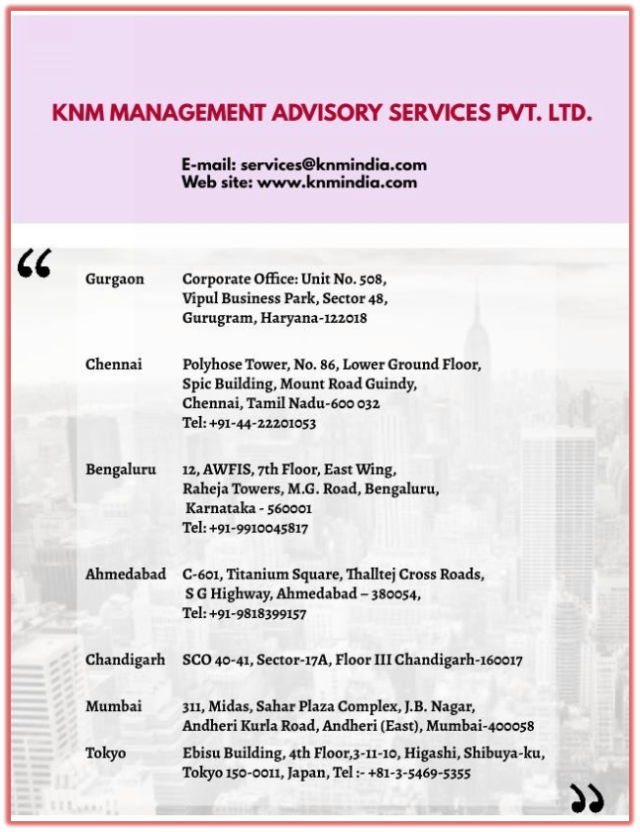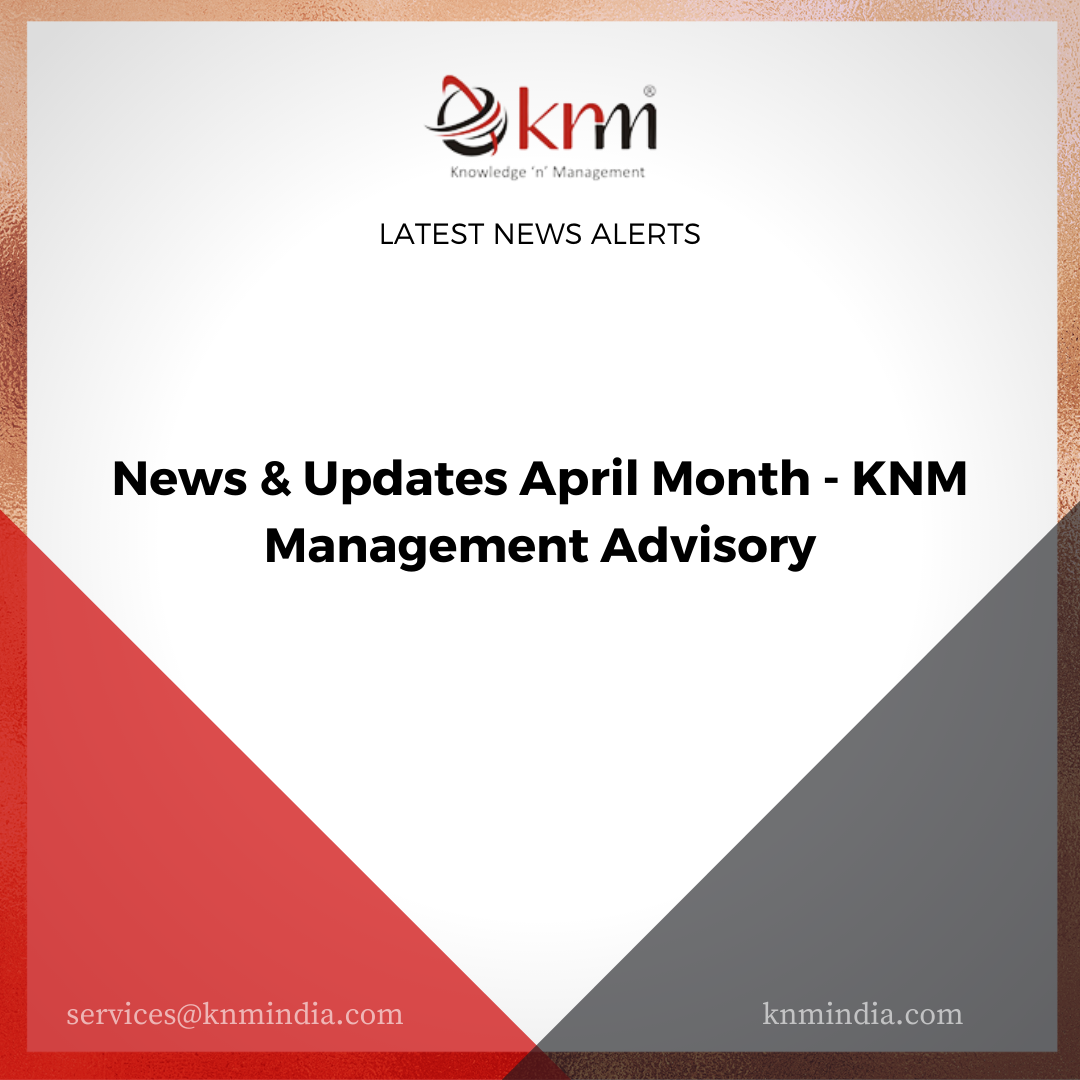Executive Summary
Income Tax
- Insertion of Additional list of conditions for furnishing mandatory return of Income.
- ITR forms have been notified for Assessment Year 2022-23.
- Relaxation from the requirement of TCS for a person who is not a resident in India and visiting India
- New Rule for Taxation of Income from retirement benefits account (RBA) maintained in a notified country
Goods & Services Tax (GST)
- New Functionalities made available for Taxpayers on GST Portal.
- BCD and AIDC from April 14, 2022, till September 30, 2022.
Companies Act 2013/ Other Laws.
- Ministry of Corporate Affairs (MCA) has once again extended the implementation of Audit Trail software to the financial year commencing on or after April 1, 2023.
- Ministry of Corporate Affairs (MCA) has notified the Companies Indian Accounting Standards Amendment Rules, 2022 w.e.f. April 01, 2022
- DGFT has extended the exemption of IGST and Compensation Cess for imports under the specified export incentive schemes till June 30, 2022.
- SEBI has issued a circular on a comprehensive risk management framework for Electronic Gold Receipts.

- CBDT vide Notification No. 37/2022, dated 21/04/2022, Notifies an additional list of conditions under section 139(1)(b) for furnishing mandatory return of income by inserting new Rule 12AB in the Income Tax Rules, 1962 as below:
– Annual Business Sales/Turnover/ Gross Receipts > Rs. 60 Lakh, or
– Annual Professional receipts > Rs. 10 Lakh, or
– TDS/TCS deducted >= Rs. 25,000 (Rs. 50,000 in case of senior citizen), or
– Annual deposit in one or more Saving accounts >= Rs. 50 Lakh.
- CBDT vide Notification No. 20/2022, dated 30/03/2022, has granted relaxation from the requirement of TCS to a person who is not a resident in India and visiting India.
- CBDT vide Notification No. 26/2022, 27/2022 dated April 05, 2022, prescribes the e-dispute Resolution scheme, 2022 and its rules along with the scope, a procedure for filing application, power, exchange of communication, and DRC rules.
- CBDT vide Notification No. 21/2022, 23/2022 dated March 30, 2022, and April 1, 2022, respectively, notifies ITR forms for Financial Year 2021-22, corresponding to the assessment year 2022-23.
- CBDT vide Notification No. 24/2022 and 25/2022 dated April 4, 2022, notifies the new rule 21AAA for taxation of Income from retirement benefits account (RBA) maintained in a notified country along with Form 10EE for the purpose of section 89A of the Act relating to relief from taxation on income earned enables a resident person to exercise the option for deferral of taxation of income from such foreign RBA to the year of withdrawal/redemption from such RBA. Where a specified person has exercised the option provided under the Rule, the total income of such person for the year in which income is taxable shall not include the income as specified as per the rule if the option is exercised by the assessee through the form to be furnished electronically on or before the due date of filing original return of income u/s 139(1) of the Act.
- CBDT vide Notification No. 17/2020 dated March 29, 2022, and circular No. 7 of 2022 dated March 30, 2022, notifies extension in the time limit for taxpayers to intimate their Aadhaar number to the prescribed authority in the prescribed form and manner to avoid repercussions along with prescribed fees till March 31, 2023. After the allowed time period for the PAN of taxpayers who fail to intimate their Aadhaar, as required, shall become inoperative and all the consequences under the Act for not furnishing, intimating, or quoting the PAN shall apply to such taxpayers.
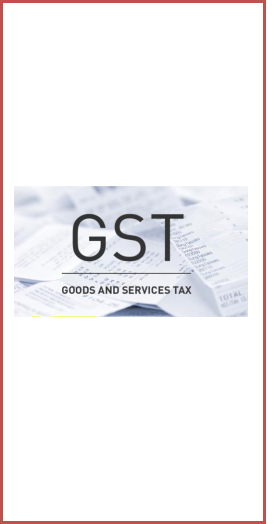
- CBIC introduced new functionalities made available for Taxpayers on GST Portal in March 2022 relating to the Home page, Registration, Return, Refund, and webinars.
- CBIC vide Notification No. 21/2022 – Customs dated April 13, 2022, exempts cotton from BCD (Basic Customs Duty) and AIDC (Agriculture Infrastructure & Development cess) from April 14, 2022, till September 30, 2022.
- CBIC vide Notification No. 19/2022 – Customs dated March 31, 2022, Seeks to extend the exemption from Integrated Tax and Compensation Cess by three (03) months i.e. up to 30.06.2022 on goods imported against AA/EPCG authorizations.
- CBIC vide Notification No. 18/2022 – Customs dated March 31, 2022 Amendment to Notification No. 52/2003 Customs dated 31.03.2003 for extending exemption from IGST and Compensation Cess to EOUs on imports till 30.06.2022.
- CBIC vide Notification No. 11/2022 – Customs (ADD) dated March 31, 2022, Seeks to extend the levy of Anti Dumping Duty on jute products originating in or exported from Nepal and Bangladesh.
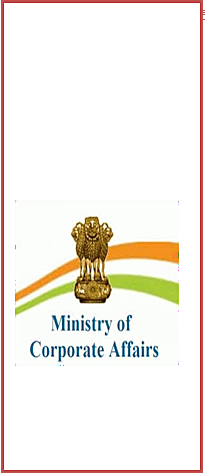
- MCA has once again extended the implementation of Audit Trail software to the financial year commencing on or after April 1, 2023. Earlier the same was extended to April 1, 2022, from April 1, 2021. Further, MCA has also extended the due date of filing Form CSR-2 to May 31, 2022, from March 31, 2022. All companies which are eligible for CSR are required to file Form CSR-2 and shall ensure to file it separately for the preceding financial year i.e., 2020-2021, on or before May 31, 2022, after filing Form AOC-4 or AOC-4 XBRL or AOC-4 NBFC (Ind AS), as is applicable.
- MCA has notified the Companies (Indian Accounting Standards) Amendment Rules, 2022 which shall come into force with effect from April 01, 2022.
These amendments are issued in consultation with the National Financial Reporting Authority (NFRA) to provide clarifications regarding Annual Improvements to Ind AS (2021). An entity shall apply Annual Improvements to Ind AS (2021) to financial liabilities that are modified or exchanged on or after the beginning of the annual reporting period in which the entity first applies the amendment. An entity shall apply that amendment for annual reporting periods beginning on or after 1st April 2022. The notification has brought a few additions and substitutions in Indian Accounting Standards (Ind AS), particularly in Ind AS 101- First-time Adoption of Indian Accounting Standards, Ind AS 103- Business Combinations, Ind AS 109- Financial Instruments, Ind AS 16- Property, Plant and Equipment, Ind AS 37- Provisions, Contingent Liabilities and Contingent Assets and Ind AS 41- Agriculture.
Through this amendment, MCA has inserted a new Rule 14(3) to restrict the inspection of register or index or return in respect of the members of a Company. According to the Amendment, particulars of the register or index or return in respect of the members of a Company related to Address or Registered Address (in case of a body corporate); e-mail ID; Unique Identification Number; PAN Number, shall not be made available for any inspection under sub-section (2) or for taking extracts or copies under sub-section (3) of Section 94 of the Companies Act.
Amendments are carried out in Rule 12 of the Companies (Incorporation) Rules, 2014 to insert a new proviso to provide that in case of a Company being incorporated as a Nidhi, the declaration by the Central Government under Section 406 of the Act shall be obtained by the Nidhi before commencing the business and a declaration in this behalf shall be submitted at the stage of incorporation by the company. Through this amendment Form INC – 20A is also revised to specifically capture the notification declaration as a Nidhi Company as one of the mandatory attachments.
SEBI
- SEBI has issued guidelines for Execution of ‘Demat Debit and Pledge Instruction’ (DDPI) for transfer of securities towards deliveries/ settlement obligations and pledging/re-pledging of securities.
These Guidelines are issued to curb possible misuse of Power of Attorney (PoA) given by clients to stockbrokers. The fresh guidelines, which will be effective from July 1, also comes against the backdrop of instances of misuse of PoAs. Under DDPI, clients can explicitly agree to authorize the stockbroker and depository participant to access their beneficiary ownership account for the limited purpose of meeting pay-in obligations for the settlement of trades executed by them, according to a circular. The use of DDPI will be limited only to two purposes. One is for the transfer of securities held in the beneficial owner account of the client towards stock exchange-related deliveries or settlement obligations arising out of trades executed by such a client. The second purpose will be for pledging/re-pledging of securities in favor of the trading member(TM)/clearing member(CM) for the purpose of meeting the margin requirements of the client. Further, the existing PoAs will continue to remain valid till the time client revokes the same. Thus, the stockbroker and depository participant will not directly or indirectly compel the clients to execute the DDPI or deny services to the client if the client refuses to execute the DDPI.
SEBI in its earlier circular advised the credit rating agencies to either align their rating scales with the rating scales prescribed under the guidelines of respective financial sector regulator or authority in terms of Regulation 9(f) of SEBI (Credit Rating Agencies) Regulations, 1999, or in absence of the same, follow rating scales prescribed by the Board vide circular dated June 15, 2011, June 13, 2019, or any other circular issued by the Board from time to time by March 31, 2022. However, based on the Representation received from credit rating agencies requesting an extension of the date of applicability of the above provisions, it has been extended till June 30, 2022, instead of March 31, 2022.
- SEBI has revised the limits for investors applying in public issues of equity shares and convertibles through Unified Payment Interface (UPI) for application amount up to Rs 5 lakh
SEBI has also asked the investors to provide their UPI ID in the bid-cum-application form submitted with any of these entities including syndicate member, stockbroker, depository participant, and registrar to issue and share transfer agent. The decision has been taken after the National Payments Corporation of India (NPCI) reviewed the systemic readiness required at various intermediaries to facilitate the processing of applications with increased UPI limits. Earlier in December 2021, NPCI enhanced the per transaction limit in UPI from Rs 2 lakh to Rs 5 lakh for UPI-based Application Supported by Blocked Amount (ASBA) in Initial Public Offers (IPOs). The new guidelines will come into force for public issues opening on or after May 1, 2022.
- SEBI has issued Clarification on the applicability of Regulation 23(4) read with Regulation 3(3)(e) of the SEBI (Listing Obligations and Disclosure Requirements) Regulations, 2015 in relation to Related PartyTransactions
These clarifications are on the period of validity of the omnibus approval where the transactions are material and shareholders ’approval for material-related party transactions. As per Regulation 23(3)(e) of the SEBI LODR, the omnibus approval granted by the Audit Committee shall be valid for a period not exceeding one year and shall require fresh approvals after the expiry of one year. Regulation 23(4) of the SEBI LODR requires shareholder approval for material Related Party Transactions and Section 96(1) of the Companies Act, 2013 specifies that the time gap between two Annual General Meetings cannot be more than fifteen months, in order to facilitate listed entities to align their processes to conduct AGMs and obtain omnibus shareholders’ approval for material RPTs, it has been decided to specify that the shareholders’ approval of omnibus RPTs approved in an AGM shall be valid up to the date of the next AGM for a period not exceeding fifteen months. In the case of omnibus approvals for material RPTs, obtained from shareholders in General meetings other than AGMs, the validity of such omnibus approvals shall not exceed one year.
Regulation 40 of SEBI LODR and bye-laws, listing agreements & regulations of the stock exchanges provide for dispute resolution under the stock exchange arbitration mechanism for disputes between a listed company and its shareholder. The stock exchanges to put in place by June 01, 2022, Standard Operating Procedures (SOP) for operationalizing the resolution of all disputes pertaining to or emanating from investor services such as transfer/transmission of shares, Demat/remat, issue of duplicate shares, transposition of holders, etc. and investor entitlements like corporate benefits, dividend, bonus shares, rights entitlements, credit of securities in the public issue, interest /coupon payments on securities, etc. Further, in respect of disputes in matters where Registrar and Share Transfer Agents (RTA) are offering services to shareholders on behalf of listed companies, the RTAs must continue to be subjected to the stock exchange arbitration mechanism. The recognized stock exchanges are directed to bring the provisions of this circular and the SOP put in place in this regard to the notice of listed companies and also to disseminate the same on their website.
- SEBI has issued a circular on a comprehensive risk management framework for Electronic Gold Receipts.
The circular pertaining to Electronic Gold Receipts (EGRs) covers various aspects, including margin collection, provision of early pay-in of funds for EGR, short-collection or non-collection of client margins, risk reduction mode, and settlement. As per the latest circular, the core of the risk management system is the liquid assets deposited by trading members with the Clearing Corporation (CC). These liquid assets will cover the requirements – Mark to Market (MTM) losses (MTM losses on outstanding settlement obligations of the member); Value at Risk (VaR) margins (VaR to cover potential losses for 99.9 percent of the days); and extreme loss margins (margins to cover the expected loss in situations that lie outside the coverage of the VaR margins). Stock exchanges and clearing corporations, in all segments, in consultation with one another, have been asked to devise a standard framework for the imposition of fines on the TM/CM for incorrect/false reporting of margins collected from the clients. The amount of fine to be charged upon the member may extend to 100 percent of such false/ incorrect amount of margin and/or suspension of trading for an appropriate number of days. With respect to risk reduction mode, the clearing corporations will have to ensure that stockbrokers and clearing members are mandatorily put in risk-reduction mode when 90 percent of the member’s collateral available for adjustment against margins gets utilized on account of trades that fall under a margin system including crystalized losses. The circular will come into force with immediate effect.
RBI
- RBI has issued a notification relating to the Compliance Function and Role of the Chief Compliance Officer (CCO) in NBFCs.
The Non-banking finance companies in the Upper Layer and Middle Layer should put in place a board-approved policy and compliance function including the appointment of a Chief Compliance Officer latest by April 1, 2023, and October 1, 2023, respectively. As part of the overall structure for corporate governance, the compliance function serves a critical role. Accordingly, it has been decided to introduce certain principles, standards, and procedures for Compliance Function in NBFC-UL and NBFC-ML, keeping in view the principles of proportionality. A copy of this circular should be placed in the immediate next meeting of the Board of Directors for information and devising an implementation strategy, under the Board’s supervision, in a time-bound manner. Further, the board or board committee should prescribe the periodicity for review of compliance risk. The Chief Compliance Officer (CCO) would be the nodal point of contact between the NBFC and the regulators and supervisors and would be a participant in the structured or other regular discussions held with RBI, according to the circular. NBFCs would be expected to carry out an annual compliance risk assessment to identify and assess major compliance risks faced by them and prepare a plan to manage the risks. The annual review should cover aspects including compliance failures, if any, during the preceding year and consequential losses and regulatory action, the listing of all major regulatory guidelines issued during the preceding year and steps taken to ensure compliance; compliance with fair practices codes and adherence to standards set by self-regulatory bodies and accounting standards; and progress in the rectification of significant deficiencies and implementation of recommendations pointed out in various audits and RBI inspection reports.
Competition Commission of India
The amendment provides that the Commission shall maintain the confidentiality of the identity of an Informant on a request made to it in writing. A party seeking confidentiality over the information or the documents furnished by it shall set out cogent reasons for such treatment and shall self-certify that making the document or documents or information or a part or parts thereof public will result in disclosure of trade secrets or destruction or appreciable diminution of the commercial value of any information or can be reasonably expected to cause serious injury. Further, the party shall confirm the following, along with the date on which such confidential treatment shall expire, on a self-certification basis that the information is not available in the public domain; that the information is known only to limited employees, suppliers, distributors and others involved in the party’s business; that adequate measures have been taken by the party to guard the secrecy of the information; that the information cannot be acquired or duplicated by others.
DGFT
Further, CBDT has also extended the exemption from payment of integrated tax and compensation cess on imports made under the Advance Authorisation (AA) and Export Promotion Capital Goods (EPCG) scheme from 31 March 2022 to 30 June 2022. A similar extension is also given for imports made by Export Oriented Units, Electronic Hardware Technology Parks, Software Technology Parks, and Bio-Technology Parks. The exemptions under Foreign Trade Policy 2015-20 include exemption from Integrated Tax and Compensation Cess under Advance Authorization under Para 4.14 of FTP 2015 -20 is extended up to 30.06.2022, Exemption from Integrated Tax and Compensation Cess under EPCG scheme under Para 5.01 (a) of FTP 2015-20 is extended up to 30.06.2022 and Exemption from Integrated Tax and Compensation Cess under EOU scheme under Para 6.01(d)(ii) of FTP 2015-20 is extended up to 30.06.2022.
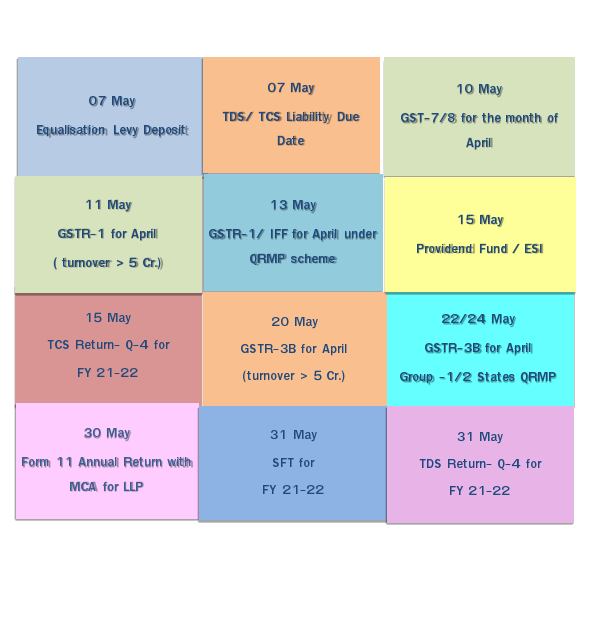
Disclaimer: Information in this note is intended to provide only a general update of the subjects covered. It is not intended to be a substitute for detailed research or the exercise of professional judgment. KNM accepts no responsibility for loss arising from any action taken or not taken by anyone using this publication. Updates are for the period 25.03.2022 till 25.04.2022.
